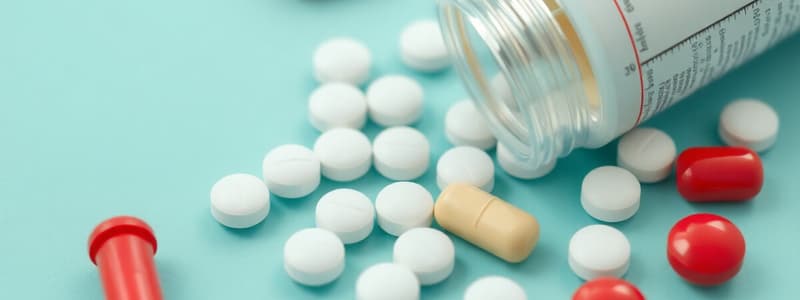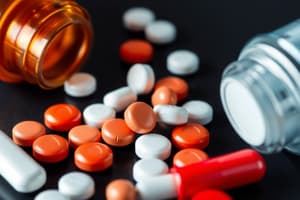Podcast
Questions and Answers
What are two reasons why blood pressure may be elevated?
What are two reasons why blood pressure may be elevated?
- Too much fluid and vasoconstriction (correct)
- Vasoconstriction and low blood volume
- Too much sodium and fluid
- Low blood volume and too much fluid
Which of the following may be risk factors for developing hypertension? (Select all that apply)
Which of the following may be risk factors for developing hypertension? (Select all that apply)
- Excessive intake of fiber
- Regular exercise
- Obesity (correct)
- Excessive intake of saturated fat and simple carbohydrates (correct)
- Alcohol consumption (correct)
Which of the following are medications used to treat hypertension?
Which of the following are medications used to treat hypertension?
- Angiotensin-converting enzyme inhibitors (correct)
- Alpha blockers (correct)
- Diuretics (correct)
- Beta blockers (correct)
- Angiotensin II receptor blockers (correct)
- Analgesics
- Calcium channel blockers (correct)
Which of the following is a common side effect of beta blockers?
Which of the following is a common side effect of beta blockers?
Which beta blockers end in '-olol'?
Which beta blockers end in '-olol'?
What is the action of beta blockers?
What is the action of beta blockers?
Which of the following medications are classified as beta blockers?
Which of the following medications are classified as beta blockers?
What are the common side effects of beta-adrenergic blockers?
What are the common side effects of beta-adrenergic blockers?
Metoprolol is a non-selective beta-blocker, meaning it blocks both beta1 and beta2 receptors.
Metoprolol is a non-selective beta-blocker, meaning it blocks both beta1 and beta2 receptors.
What is the primary action of alpha-adrenergic blockers like Prazosin?
What is the primary action of alpha-adrenergic blockers like Prazosin?
Which of the following is NOT a common use for Prazosin?
Which of the following is NOT a common use for Prazosin?
Which of these is NOT a common side effect of Calcium Channel Blockers?
Which of these is NOT a common side effect of Calcium Channel Blockers?
Angiotensin Converting Enzyme (ACE) inhibitors typically end in '-______' and are known for potentially causing a dry cough.
Angiotensin Converting Enzyme (ACE) inhibitors typically end in '-______' and are known for potentially causing a dry cough.
Which of the following is NOT a contraindication for the use of ACE Inhibitors?
Which of the following is NOT a contraindication for the use of ACE Inhibitors?
What is the primary action of Angiotensin II Receptor Blockers (ARBs)?
What is the primary action of Angiotensin II Receptor Blockers (ARBs)?
ARBs are known to cause the same persistent dry cough that is common with ACE inhibitors.
ARBs are known to cause the same persistent dry cough that is common with ACE inhibitors.
Which of these is a contraindication for the use of Angiotensin II Receptor Blockers (ARBs)?
Which of these is a contraindication for the use of Angiotensin II Receptor Blockers (ARBs)?
What are some crucial nursing assessments when caring for a patient on antihypertensive medications?
What are some crucial nursing assessments when caring for a patient on antihypertensive medications?
Match the type of antihypertensive medication with its typical ending:
Match the type of antihypertensive medication with its typical ending:
African Americans often respond well to diuretics as initial monotherapy for hypertension.
African Americans often respond well to diuretics as initial monotherapy for hypertension.
A patient on a diuretic for hypertension should report which of these symptoms to their healthcare provider?
A patient on a diuretic for hypertension should report which of these symptoms to their healthcare provider?
It's safe for patients to stop taking their antihypertensive medication abruptly if they feel better.
It's safe for patients to stop taking their antihypertensive medication abruptly if they feel better.
What is a common nursing instruction for patients on beta-blockers?
What is a common nursing instruction for patients on beta-blockers?
What are some important teaching points for patients on ACEI and A2RB?
What are some important teaching points for patients on ACEI and A2RB?
A patient's blood pressure is 140/92 mm Hg. How would you classify this blood pressure?
A patient's blood pressure is 140/92 mm Hg. How would you classify this blood pressure?
Flashcards
Antihypertensives
Antihypertensives
Medications used to lower high blood pressure.
Physiologic Risk Factors
Physiologic Risk Factors
Underlying biological reasons for high blood pressure.
Saturated & Simple Carbs
Saturated & Simple Carbs
Dietary components linked to high blood pressure.
Alcohol
Alcohol
Signup and view all the flashcards
Obesity
Obesity
Signup and view all the flashcards
Diuretics
Diuretics
Signup and view all the flashcards
Beta Blockers
Beta Blockers
Signup and view all the flashcards
Metoprolol
Metoprolol
Signup and view all the flashcards
Propranolol
Propranolol
Signup and view all the flashcards
Alpha Blockers
Alpha Blockers
Signup and view all the flashcards
Prazosin
Prazosin
Signup and view all the flashcards
Calcium Channel Blockers
Calcium Channel Blockers
Signup and view all the flashcards
Amlodipine
Amlodipine
Signup and view all the flashcards
ACE Inhibitors
ACE Inhibitors
Signup and view all the flashcards
Lisinopril
Lisinopril
Signup and view all the flashcards
ARBs
ARBs
Signup and view all the flashcards
Losartan
Losartan
Signup and view all the flashcards
Cultural Differences
Cultural Differences
Signup and view all the flashcards
Nursing Process
Nursing Process
Signup and view all the flashcards
Teaching Patients
Teaching Patients
Signup and view all the flashcards
Stage 1 Hypertension
Stage 1 Hypertension
Signup and view all the flashcards
Monotherapy
Monotherapy
Signup and view all the flashcards
Rebound Hypertension
Rebound Hypertension
Signup and view all the flashcards
Dry Cough
Dry Cough
Signup and view all the flashcards
Renal Disease
Renal Disease
Signup and view all the flashcards
Monitoring Blood Pressure
Monitoring Blood Pressure
Signup and view all the flashcards
Hypertension
Hypertension
Signup and view all the flashcards
Fluid Overload
Fluid Overload
Signup and view all the flashcards
Vasoconstriction
Vasoconstriction
Signup and view all the flashcards
Alcohol & Renin
Alcohol & Renin
Signup and view all the flashcards
Obesity & Hypertension
Obesity & Hypertension
Signup and view all the flashcards
Stress Management
Stress Management
Signup and view all the flashcards
Exercise & Hypertension
Exercise & Hypertension
Signup and view all the flashcards
Salt Restriction
Salt Restriction
Signup and view all the flashcards
Diuretics & Blood Pressure
Diuretics & Blood Pressure
Signup and view all the flashcards
Beta Blockers & Heart
Beta Blockers & Heart
Signup and view all the flashcards
Beta Blocker Suffix
Beta Blocker Suffix
Signup and view all the flashcards
Alpha Blockers & Vasodilation
Alpha Blockers & Vasodilation
Signup and view all the flashcards
Prazosin & Uses
Prazosin & Uses
Signup and view all the flashcards
Calcium Channel Blockers & Cells
Calcium Channel Blockers & Cells
Signup and view all the flashcards
Calcium Channel Blocker Suffix
Calcium Channel Blocker Suffix
Signup and view all the flashcards
ACE Inhibitors & Renin
ACE Inhibitors & Renin
Signup and view all the flashcards
ACE Inhibitor Suffix
ACE Inhibitor Suffix
Signup and view all the flashcards
Angiotensin II Receptor Blockers
Angiotensin II Receptor Blockers
Signup and view all the flashcards
ARB Suffix
ARB Suffix
Signup and view all the flashcards
African Americans & Hypertension
African Americans & Hypertension
Signup and view all the flashcards
Nursing Process: Assessment
Nursing Process: Assessment
Signup and view all the flashcards
Nursing Process: Planning
Nursing Process: Planning
Signup and view all the flashcards
Nursing Process: Implementation
Nursing Process: Implementation
Signup and view all the flashcards
Nursing Process: Evaluation
Nursing Process: Evaluation
Signup and view all the flashcards
Patient Education
Patient Education
Signup and view all the flashcards
Dry Cough & ACEIs
Dry Cough & ACEIs
Signup and view all the flashcards
Renal Disease & Alpha Blockers
Renal Disease & Alpha Blockers
Signup and view all the flashcards
Study Notes
Antihypertensives
- Antihypertensives are drugs used to lower blood pressure.
- Physiologic risk factors for hypertension include excessive fluid intake, vasoconstriction, excessive intake of saturated fat and simple carbohydrates, alcohol intake (increases renin secretions), and obesity.
- Cultural responses to antihypertensive agents differ between groups, including African Americans and Asian Americans.
Nonpharmacological Control of Hypertension
- Nonpharmacologic methods to control hypertension include stress-reduction techniques, exercise, salt restriction, decrease alcohol ingestion, and smoking cessation.
Antihypertensive Drugs
- Diuretics, beta-adrenergic blockers, alpha-adrenergic blockers, calcium channel blockers, angiotensin-converting enzyme inhibitors, and angiotensin II receptor blockers are types of antihypertensive drugs.
Beta-Adrenergic Blockers
- Beta-adrenergic blockers end in "-olol."
- Metoprolol is a more selective beta₁ blocker.
- Propranolol is a nonselective beta₁ and beta₂ blocker.
- Action: Blocks adrenergic affect, lowering blood pressure and heart rate.
- Uses include hypertension, anti-dysrhythmic, and anti-angina.
- It can be used as dual therapy with diuretics for African Americans.
- Side effects/adverse reactions are similar to those studied in unit 4.
- Contraindications are the same as those studied in unit 4. Propranolol is contraindicated in those with asthma or COPD.
- Interactions are the same as those in unit 4.
Alpha-Adrenergic Blockers
- Alpha-adrenergic blockers include prazosin.
- Action: Blocks alpha-adrenergic receptors, leading to vasodilation and decreased blood pressure.
- Uses include hypertension, heart failure, benign prostatic hypertrophy.
- It can be used as monotherapy for African Americans.
- Side effects/adverse reactions can include dizziness, drowsiness, headache, peripheral edema, weight gain, urinary incontinence, erectile dysfunction, orthostatic hypotension, palpitations, and elevated liver enzymes.
- Contraindications include caution and decreased blood pressure.
- Interactions include other drugs that lower blood pressure, high protein-binding drugs, alcohol, and over-the-counter (OTC) cold medications.
Calcium Channel Blockers
- Calcium channel blockers end in "-pine."
- Amlodipine, verapamil, and diltiazem are examples.
- Action: Blocks calcium movement in and out of cells, promoting vasodilation and decreasing heart rate.
- Uses include hypertension, anti-angina, anti-dysrhythmic, and peripheral vascular disease.
- It can be used as monotherapy for African Americans.
- Side effects/adverse reactions can include flushing, headache, dizziness, peripheral edema, erectile dysfunction, hypotension, and bradycardia.
- Contraindications include caution and hepatic impairment.
- Interactions include other drugs that lower blood pressure and cold medications.
Angiotensin-Converting Enzyme (ACE) Inhibitors
- ACE inhibitors end in "-pril."
- Lisinopril is an example.
- Action: Inhibits angiotensin II formation, blocking vasoconstriction and aldosterone release; increases water and sodium excretion, and potassium retention.
- Uses include hypertension and heart failure.
- It can be used as dual therapy along with diuretics for African Americans.
- Side effects/adverse reactions include a constant irritating cough, headache, GI upset, insomnia, erectile dysfunction, orthostatic hypotension, hyperkalemia, tachycardia, and angioedema.
- Contraindications include pregnancy and use with potassium-sparing diuretics or salt substitutes containing potassium.
- Interactions include potassium-containing medications, other antihypertensives, and OTC cold medications.
Angiotensin II Receptor Blockers (ARBs)
- ARBs end in "-sartan" or "-tan."
- Losartan is an example.
- Action: Blocks angiotensin II binding to receptors, inhibiting vasoconstriction and aldosterone release, thereby promoting sodium and water release and potassium retention.
- Uses include hypertension and heart failure.
- Side effects/adverse reactions include dizziness, drowsiness, fatigue, insomnia, headache, erectile dysfunction, orthostatic hypotension, hyperkalemia, hypotension, and renal dysfunction.
- Contraindications include pregnancy and lactation.
- Interactions include other antihypertensives, alcohol,NSAIDs, and OTC cold medications.
Nursing Process for Antihypertensives
- Assessment: Vital signs, knowledge of drugs that lower heart rate and electrolytes, medication and medical history, renal and liver function, weight, edema, and I&O are considerations.
- Teaching: Take blood pressure and pulse daily. Report changes. Weigh daily and report consistent gains. Get up slowly. Do not abruptly stop taking antihypertensives. Check with healthcare providers before taking OTC meds, especially cold medications. Teach diabetes patient interactions. ACE inhibitors and ARBs - teach no salt substitutes with K, low K diet, no potassium supplements
Practice Questions & Answers (Summarized)
- Practice Question #1 Answer: B, indicating stage 1 hypertension.
- Practice Question #2 Answer: A, losartan (Cozaar).
- Practice Question #3 Answer: D, dizziness.
- Practice Question #4 Answer: C, alpha-adrenergic blockers.
- Practice Question #5 Answer: C, rebound hypertension.
- Practice Question #6 Answer: D, a dry cough.
- Practice Question #7 Answer: A, renal disease.
- Practice Question #8 Answer: B, monitor blood pressure carefully.
Studying That Suits You
Use AI to generate personalized quizzes and flashcards to suit your learning preferences.




